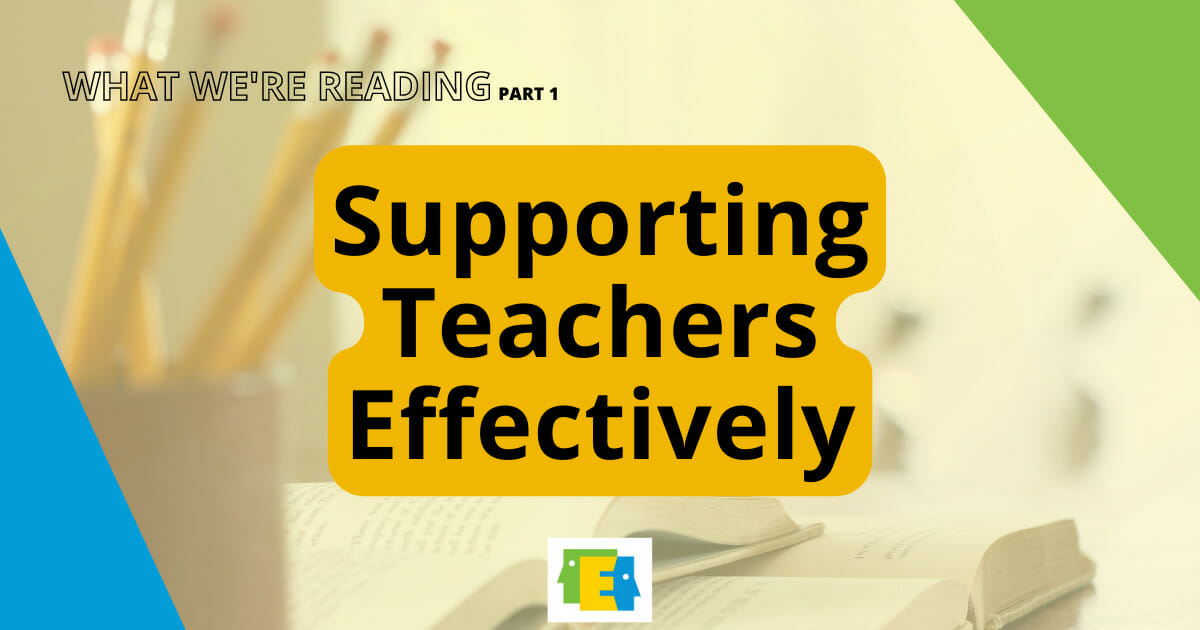What We’re Reading: 3 Resources for Supporting Teachers and Reducing Burnout

Whether you’re an instructional coach, school leader, or a fellow educator down the hall, supporting teachers effectively can be difficult.
From struggling with being a new teacher to feeling afraid to take risks, successful teaching in the classroom is often hindered by burnout. But that is why supporting teachers is more important than ever.
We’ve rounded up the top recent reads and resources about supporting teachers and have the highlights you need to better help teachers do their best teaching.
Check out the key strategies below, as well as links to the full articles (and related content!).
Reducing teacher burnout starts with listening to teachers
Teachers have many responsibilities, both inside and outside the classroom. The huge amount of work on teachers’ plates often results in burnout, leaving teachers feeling stressed and overwhelmed.
This SmartBrief article outlines five strategies for people supporting teachers to help address and reduce teacher burnout and “bring back the joy of teaching.”
Here are two of the strategies to support teachers:
- Listen to teachers. As the staff members who have the most interaction with students, teachers know best. They’re on the front lines of education and are often the first to see problems, identify solutions and meet the needs of students.
Listening to teachers not only helps them feel appreciated and results in better classroom practices; it also ensures that K-12 leaders are taking care of faculty needs.
In the same way we ensure that the basic needs of students are met before learning occurs, educators must have their own needs met before they can effectively tend to their students. - Provide targeted support. Educators must have the resources they need to do their work, including high-quality teaching materials as well as the time and space to learn and implement new techniques in their classrooms.
Providing targeted support means helping them prioritize which problems to solve and then giving them the resources they need to address these problems effectively.
Focus on delivering meaningful professional development that increases teachers’ ability to ideate solutions. Structure this professional learning in a way that allows for choice and self-differentiation.
Find the full article, with all five strategies for supporting teachers, at SmartBrief: Teacher burnout is real. These 5 strategies can help
Looking for personalized teacher professional development? Each teacher’s experience within the AI Coach platform is tailored to their own priority areas for professional growth.
For more about which skills instructional coaches need for effectively supporting teachers, check out our blog post: 3 Skills and a Conversational Framework: What You Need for Better Instructional Coaching
Supporting teachers includes fostering their psychological safety
What is psychological safety and why is it important for supporting teachers effectively?
This ASCD article explains:
The term was originally coined by Harvard Business School professor Amy Edmondson, who defines psychological safety as “a shared belief that the team is safe for risk-taking.”
Psychological safety is a necessary precondition for generative dialogue, earnest risk-taking, cognitive friction, and genuine vulnerability among colleagues—the cocktail of collaborative skills that fosters trust, commitment, and accountability, and leads to results in the workplace.
Fostering a culture of psychological safety means teachers feel respected and empowered to teach and take risks in the classroom.
One of the key elements of supporting teachers to feel more psychologically safe is to model vulnerability.
When school leaders or instructional coaches share openly about wins or challenges, whether professional or personal, team members trust each other more.
The article notes, “A team that knows and trusts each other is more capable than a team that doesn’t. Knowing someone well, understanding how they think, how they feel about different topics, and how they engage with the world are the building blocks of trust and psychological safety.”
Teachers who feel more supported and safe in this way can then be more engaged in their teaching and learning.
Find the full article at ASCD: Fostering Psychological Safety Among Staff, One Hour at a Time
Wondering how to foster positive school culture? Check out this blog post: One Founding Principal’s Strategies for Building Positive School Culture
New teachers need support from fellow educators, not just school leaders
School leaders and academic coaches are tasked with supporting teachers. But teachers new to teaching need “more practical and more personal” help, too, according to this Edutopia article.
This guidance can come from fellow educators, perhaps more veteran teachers in the same building.
So how can veteran teachers support new teachers?
One form of support highlighted in this article is rooted in listening and encouraging self-reflection:
In my first few years, I would often share my concerns and stresses with my colleagues who had become my friends. They’d listen carefully, and they never offered advice. Most of the time, they knew I just needed to vent.
When I did ask for advice … they’d usually ask me more questions until I came to my own conclusion on how to solve my issue or how to reframe my thinking. In other words, they had me reflect on myself and figure out what I was in control of and what I could change.
More seasoned teachers can be a listening ear for new teachers who may be overwhelmed.
And instead of offering all of the solutions, encouraging self-reflection is key to supporting teachers.
When new educators learn to reflect on their own teaching practices, this self-reflection empowers them to problem-solve and set goals on their own.
Find the full article, including four other ways experienced educators can support new teachers, at Edutopia: 5 Ways Seasoned Veterans Can Support New Teachers
Try a free tool to enable teachers to reflect on their own teaching.



